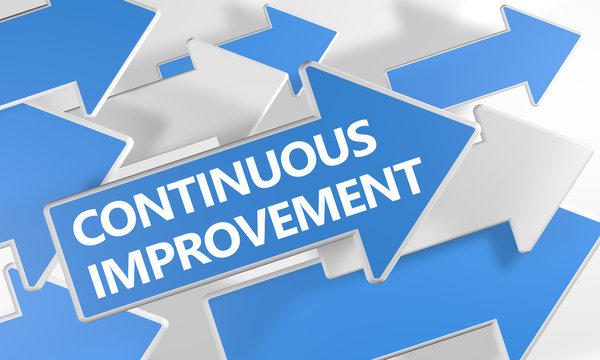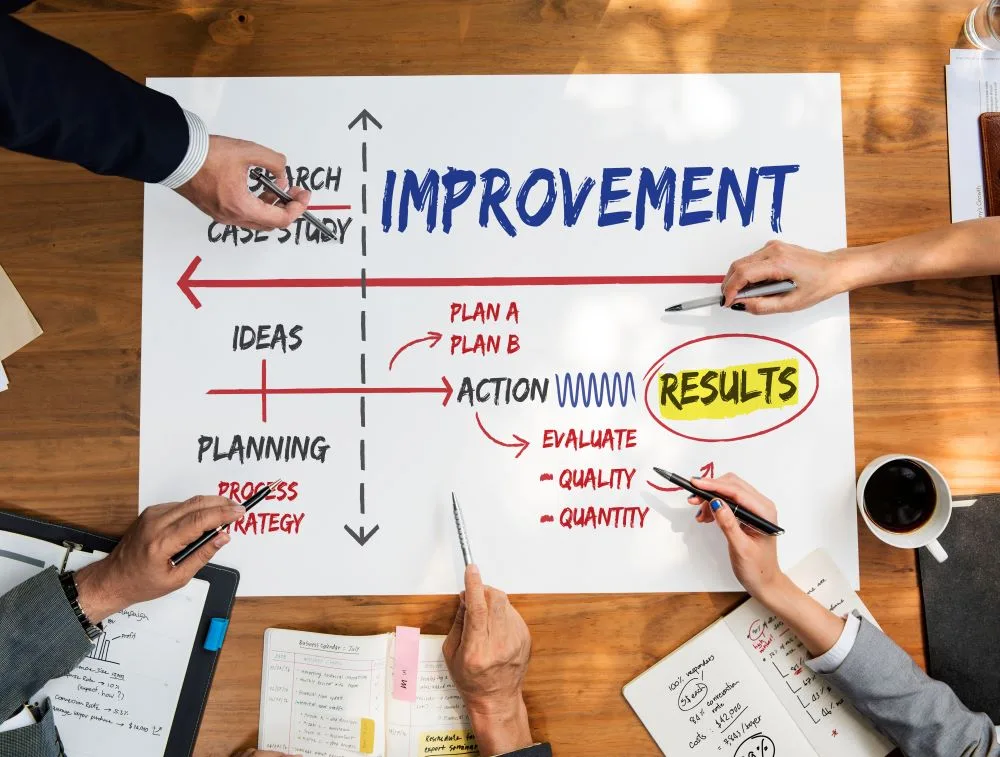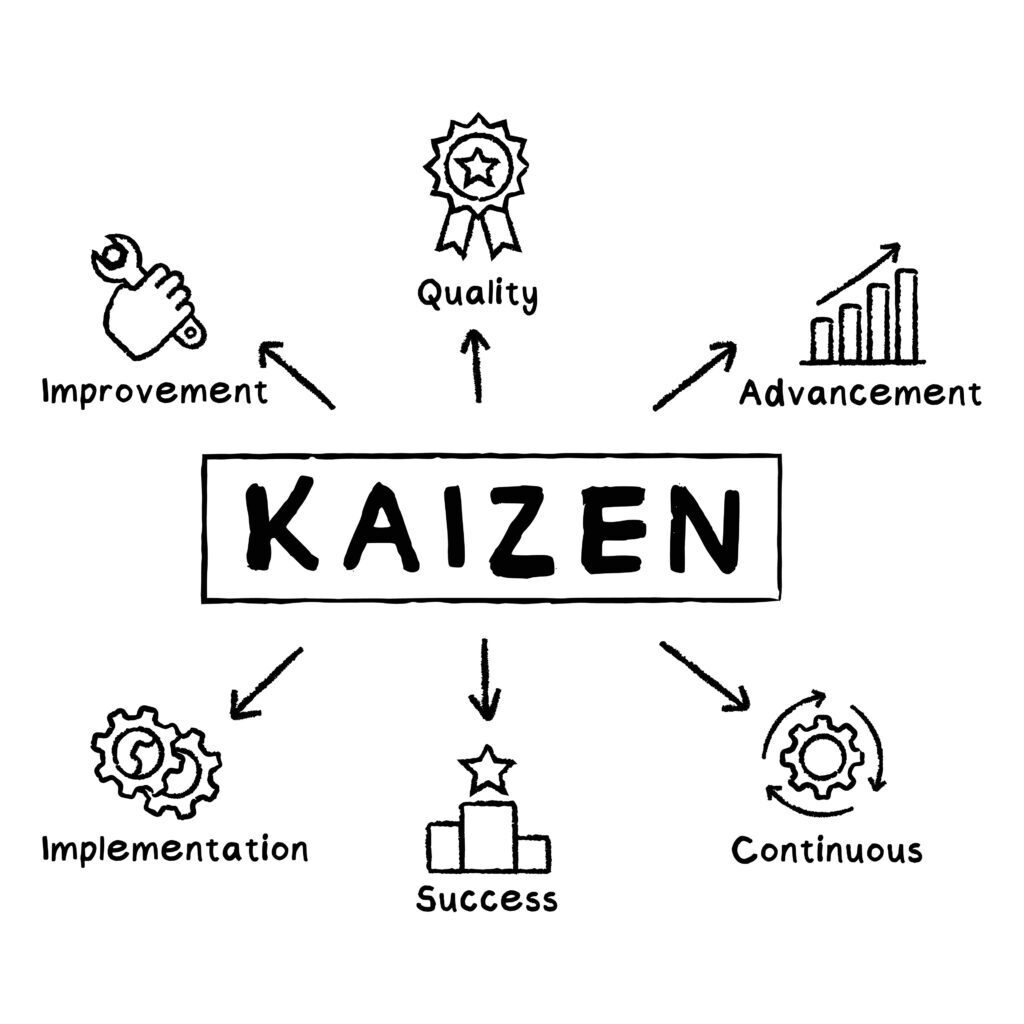The Science of Continuous Improvement: Kaizen Principles for Senior Professionals
In a rapidly changing business landscape, senior professionals face the ever-present challenge of staying competitive and relevant. The pursuit of continuous improvement is essential, and one methodology that has proven to be highly effective is Kaizen.
Let’s explore the science of continuous improvement and how Kaizen principles can be applied by senior professionals to enhance their personal and organizational growth.
Understanding Kaizen
Kaizen, a Japanese term meaning “change for better” or “continuous improvement,” is a philosophy and methodology that originated in Japan in the 1950s. It gained worldwide recognition for its role in transforming post-World War II Japanese industries into global leaders. At its core, Kaizen is about making incremental, small improvements to processes, products, or personal practices on a daily basis.

Kaizen Principles for Senior Professionals
Let’s delve into the Kaizen principles and explore how senior professionals can incorporate them into their careers and organizations.
- Embrace a Culture of Continuous Improvement
One of the fundamental principles of Kaizen is the establishment of a culture that values ongoing progress. Senior professionals can foster this culture by encouraging their teams to regularly seek improvements and by being open to new ideas and suggestions. It’s essential to create an environment where everyone feels that their contributions to the improvement process are valued.
- Start Small: Kaizen in Daily Life
Kaizen’s core philosophy emphasizes taking small, manageable steps towards improvement. Senior professionals can apply this principle in their personal lives by setting achievable daily or weekly goals for self-improvement. Whether it’s acquiring a new skill, reading a relevant article, or networking with industry peers, small steps can lead to significant personal growth.
- Continuous Learning
Kaizen advocates the relentless pursuit of knowledge and skill development. Senior professionals should allocate time for continuous learning, whether it’s through attending seminars, workshops, or online courses. Staying informed about the latest industry trends and technologies is vital to remain competitive.
- Gemba Walks: Be Present
The concept of “Gemba” refers to the place where value is created – the workplace. Senior professionals should regularly engage in Gemba walks to better understand their organization’s operations, challenges, and opportunities. This hands-on approach allows for real-time problem-solving and encourages communication among team members.
- Standardize Processes
Standardization is crucial in Kaizen. Senior professionals should work towards defining and standardizing processes within their organizations. This ensures that everyone is on the same page, reducing inefficiencies and errors.

- Measure and Analyze
Data-driven decision-making is another integral component of Kaizen. Senior professionals should implement key performance indicators (KPIs) to track progress and identify areas for improvement. Regular analysis of data can lead to insights that inform strategic decisions.
- Encourage Employee Involvement
Involving employees in the improvement process is a cornerstone of Kaizen. Senior professionals should create platforms for employees to share their ideas and concerns. Empowering staff to contribute to the company’s betterment fosters a sense of ownership and engagement.
- Cross-Functional Collaboration
Kaizen encourages collaboration across departments and functions. Senior professionals should facilitate cross-functional teams to tackle complex problems or projects. Different perspectives and expertise can lead to innovative solutions.
- Eliminate Waste
Kaizen identifies eight forms of waste: defects, overproduction, waiting, non-utilized employee talent, transportation, inventory, motion, and extra-processing. Senior professionals should constantly seek to eliminate these forms of waste, reducing costs and improving efficiency.
- Kaizen Events
Organizing Kaizen events, which are focused, time-bound improvement initiatives, can be highly effective for senior professionals. These events provide a concentrated effort to address specific issues or opportunities within the organization.
- PDCA Cycle: Plan, Do, Check, Act
The PDCA cycle is a continuous improvement framework used in Kaizen. Senior professionals should apply this cycle by planning improvements, executing them, checking results, and making necessary adjustments. This iterative approach ensures sustainable growth.

Benefits of Applying Kaizen Principles for Senior Professionals
By incorporating Kaizen principles into their careers, senior professionals can reap a multitude of benefits.
- Sustained Personal Growth
Applying Kaizen in daily life can lead to sustained personal growth. Continuous learning and small improvements accumulate over time, resulting in a more knowledgeable and skilled professional.
- Enhanced Leadership Skills
Embracing a culture of continuous improvement encourages leadership qualities. Senior professionals who prioritize Kaizen lead by example and inspire their teams to do the same.
- Increased Productivity
Standardizing processes, eliminating waste, and fostering employee involvement can lead to increased productivity within an organization. Senior professionals who adopt Kaizen principles contribute to a more efficient workplace.
- Better Decision-Making
By measuring and analyzing data, senior professionals can make more informed decisions. This results in strategies that are rooted in facts and figures, rather than guesswork.
- Improved Employee Satisfaction
Involving employees in the improvement process and valuing their contributions can enhance job satisfaction and morale. Happy employees are more productive and engaged in their work.
- Competitive Advantage
Organizations that continuously improve their processes and products gain a competitive edge. Senior professionals who lead their organizations in adopting Kaizen principles position their companies for long-term success.

Challenges of Implementing Kaizen for Senior Professionals
While Kaizen offers numerous benefits, it’s essential to be aware of potential challenges when implementing these principles.
- Resistance to Change
Some employees or team members may be resistant to change, especially if they are accustomed to existing processes. Senior professionals need to manage this resistance through effective communication and collaboration.
- Time and Resource Constraints
Implementing Kaizen requires an investment of time and resources. Senior professionals must balance the pursuit of continuous improvement with other organizational priorities.
- Overcoming Plateaus
After initial successes, organizations may encounter plateaus where further improvements become more challenging. Senior professionals must persist and adapt their approaches to continue progress.

In conclusion, the science of continuous improvement, as embodied by Kaizen, offers a transformative approach for senior professionals to remain competitive and relevant in their careers. By embracing a culture of ongoing improvement, applying Kaizen principles, and reaping the numerous benefits, senior professionals can navigate the challenges of a rapidly changing business landscape with confidence and success. Continuous improvement is not a destination; it’s a journey that, when undertaken with dedication and commitment, can lead to extraordinary personal and organizational growth.
Embrace Kaizen, and make every day an opportunity for change, growth, and success.





